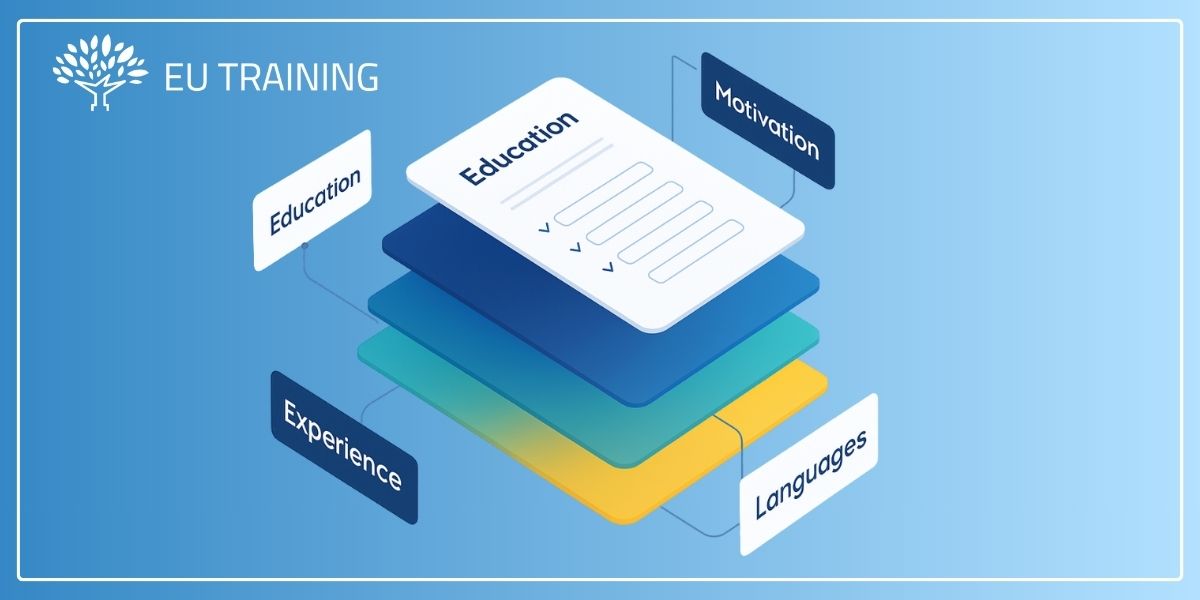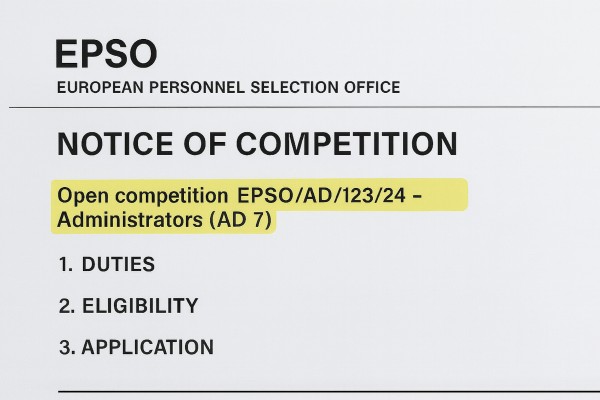
Reading time: 9 minutes
Step-by-Step Guide for EU Careers
If you’re applying for an EU job, your application isn’t just a formality, it’s the first stage of the competition, and in some cases, the first test. Whether you're targeting an open competition like the AD5 Generalist, a CAST position, a Temporary Staff selection, or an internal competition, a clear and well-structured application can make the difference between getting shortlisted or being filtered out early.
This guide is for first-timers, second-chancers, civil servants looking to transition, and specialists aiming for profile-based roles. Drawing on years of experience working at EPSO, Luc Gillis outlines what assessors look for, how to avoid common mistakes, and how to present your experience in a way that matches what EPSO actually wants.
Let’s get started with what really matters, and what doesn’t.
1. Understand the EPSO competition and selection structure
Before writing your application, it’s essential to understand which type of selection procedure you're applying for. Each type has slightly different rules, expectations, and application formats, and knowing these up front will save you time and help you focus. For more details read this Complete Guide on the EPSO exams.
What are the main selection types?
- AD (Administrator) competitions | Open to graduates. The most common entry point is AD5, where candidates are expected to show potential and adaptability, not necessarily years of experience. These are run through open competitions published by EPSO.
- AST (Assistant) and AST/SC (Secretary/Clerk) competitions | Targeted at candidates with specific technical, administrative, or support skills. AST3 is often open to candidates with a few years of experience.
- CAST (Contract Agent Selection Tool) | These are ongoing selection procedures, not tied to fixed deadlines. You apply via a Call for Expression of Interest (CEI) and are added to a database. If your profile is selected, you’re invited to take reasoning tests and possibly a field-related interview. This is used for contract agent roles across EU institutions and agencies.
- Temporary Staff selections | These posts are published by individual institutions or agencies (not always through EPSO). The process usually starts with a CEI and includes similar steps to CAST or internal competitions.
- Internal Competitions | These are open only to current EU staff (e.g. contract agents, ASTs) who want to move up or across into a different role. The format can vary but often includes a written test and interview phase.
Where does the application fit in?
Your application is the first step in all selection types. It's used to check:
- If you meet the eligibility criteria
- If your experience matches the profile
- In some cases, to shortlist candidates for the next phase
In CAST and Temporary selections, your application also acts as a searchable CV in a database - if it’s not well written or doesn’t include relevant keywords, it may never be seen.
The Notice of Competition and Call for Expression of Interest: Read it like a pro
The Notice of Competition (NoC) or Call for Expression of Interest (CEI) is your official reference document. It tells you:
- What the selection process looks like
- What tests you’ll take and in which order
- Language requirements
- What to include in your application
- The eligibility criteria and any disqualifying factors
Tip: Print it, highlight the must-know points, and keep it next to you while filling out the form. Many avoidable rejections happen because a candidate didn’t follow what’s written in the NoC or CEI.
Luc’s advice: “Always read the full NoC or CEI. Don’t rely on summaries or assumptions. It’s what the Selection Board will refer to when assessing your eligibility and performance.”

2. The key elements of the EPSO application
The EPSO application form may seem simple at first glance, but each section has a purpose, and skipping details can lead to disqualification or missed opportunities later. Here’s what it typically includes:
What are the core sections of an EPSO application?
- Personal details – name, nationality, contact details
- Language knowledge – select Language 1 (for tests) and Language 2 (for communication and test phases)
- Education – completed degrees (must be obtained by the deadline stated in the NoC)
- Professional experience – job titles, dates, responsibilities (should be backed up later by contracts, payslips, and job descriptions)
The motivation section – why it matters
This section is often overlooked, don’t make that mistake.
Unless stated otherwise in the NoC, the motivation text is not considered during the eligibility check. But it can make a difference at the recruitment phase, especially if you’re on the reserve list and institutions are deciding whom to invite for interviews.
Write this section carefully. It should:
- Show your commitment to public service
- Reflect your understanding of the EU’s work and values
- Emphasise perseverance, potential, and what you can contribute
Luc’s advice: “Even if it’s not scored, a strong motivation statement helps decision-makers see you as a future colleague, not just a name on a list.”
Deadlines – non-negotiable
Missing a deadline can get you excluded from the competition. The most important dates are:
- Closing date for registration (found in the NoC)
- Deadline to upload documents
- Complaint or review request deadlines
Additional deadlines and instructions will be communicated through your Single Candidate Portal (SCP). Check it regularly.
What documents do you need to prepare and upload?
You’ll need to upload scanned copies of:
- A valid ID or passport
- Degree certificates
- Employment contracts
- Payslips corresponding to each role listed
- Job descriptions (if available)
These must be attached to the competition you applied for, uploading them to your general EPSO profile is not enough.

3. The 13 most common mistakes in EPSO applications
Even strong candidates can get tripped up by simple mistakes, many of which can be avoided with a bit of planning and attention to detail. Here are the most frequent errors seen in EPSO applications:
-
Using vague or generic language
Phrases like “team player” or “hard worker” say little. Describe concrete actions and results. -
Copy-pasting job descriptions
Listing duties from your contract or HR file won’t show what you actually achieved. -
Not tailoring your experience to the profile
EPSO assessors want to see relevance to the job and field — generic content won’t stand out. -
Failing to show EU-specific motivation
Applications should reflect your interest in EU values, institutions, and policymaking — not just a general desire to work in an international environment. -
Poor structure or unclear wording
The quality of your writing reflects your ability to communicate clearly, especially important at AD level. -
Skipping the Notice of Competition and General Rules
These documents contain the exact eligibility criteria and formal requirements. Missing them means missing the basics. -
Choosing Language 1 and 2 without reflection
Make sure your chosen languages match your strengths and the languages used for each test phase. This affects both performance and eligibility. -
Leaving out exact dates (DD/MM/YYYY)
Fuzzy timelines will result in rejection. EPSO requires full start and end dates for both studies and jobs. -
Assuming you can edit later
Once the registration deadline passes, your application is locked. No edits or corrections are possible. -
Not justifying your job titles or responsibilities
Titles alone aren’t enough — explain your tasks and link them to the job profile you’re applying for. -
Writing your application at the last minute
Rushed submissions lead to incomplete sections, errors, and weak motivation texts. -
Listing degrees or jobs without proof
If you can't back it up with documentation (diplomas, contracts, payslips), don’t include it. -
Missing required professional experience
If the NoC specifies “at least 3 years of relevant experience,” it must be stated and evidenced in your application.
Luc’s advice: “Your application is not just a form — it’s your first test. Treat it with the same care you would any exam.”
4. How can you tailor your application to the competition profile?
EPSO doesn’t use one-size-fits-all criteria, and neither should your application. Different selection procedures target different career stages and goals. To be competitive, you must match your tone, experience, and motivation to the type of competition you're applying for.
EPSO AD5 Generalist competition
This is the entry point for permanent administrator roles and is open to recent graduates. What matters here is not experience, but potential.
Your application should:
-
Show flexibility and ability to adapt in a multilingual, multicultural environment
-
Highlight your interest in EU affairs or public policy
-
Emphasise skills like clear communication, analysis, teamwork, and learning capacity
-
Include any relevant academic work, internships, or volunteer experience that shows future promise
CAST (Contract Agent) selections
CAST applications go into a searchable database, and your goal is to be selected for testing.
Your application should:
-
Clearly link your professional experience to the domain selected in the CEI
-
Use relevant keywords that recruiters might search for (job titles, EU programmes, specialist terms)
-
Frame your work in an EU context where possible — mention EU projects, international experience, cross-border cooperation
The CAST database is large. If your profile doesn’t stand out or isn’t easy to find, it may never be selected.
Temporary Staff selections
Temporary posts often require experienced specialists and are published directly by institutions or agencies.
Your application should:
-
Show unquestionable domain expertise
-
Demonstrate your added value to the EU in the role and field in question
-
Clearly state your immediate availability in the motivation section
-
Follow any specific format or instructions in the CEI
Internal Competitions
These are for current EU staff aiming to move up or into a new role.
Your application should:
-
Demonstrate your professional growth and insights gained in your current role
-
Highlight skills that match the new grade or stream
-
Reflect your readiness to take on higher responsibilities
-
Be consistent with institutional values and expectations — you are applying to become a permanent official or progress to a superior grade
Luc’s advice: “Tailoring doesn’t mean rewriting your CV — it means adjusting your focus. What matters for AD5 won’t be enough for CAST, and vice versa.”
5. Luc’s expert tips for a standout application
Luc Gillis has seen thousands of EPSO applications — and rejected plenty. Here are his core recommendations for writing an application that doesn’t just meet the criteria, but captures attention.
1. Start with the basics
Read the Notice of Competition (NoC) and General Rules in full. This is your blueprint. Everything in your application should align with what’s written there, including eligibility, required experience, and test languages.
2. Use the STAR method
-
Situation – the context
-
Task – your responsibility
-
Action – what you did
-
Result – what changed because of your contribution
This helps the assessor quickly understand the value of your experience.
3. Use bullet points
Long blocks of text are hard to read under time pressure. Break up experience entries into 2–4 bullet points per job, each one focused on a result or key activity.
4. Mention the corresponding Roman numerals
Check the “Areas and Activities” section in the NoC. Each competition defines specific work areas, often listed using Roman numerals (I, II, III...). Reference them directly in your experience where relevant.
Example: “(III) Provided legal advice on EU-funded programmes, ensuring compliance with national and EU-level regulations.”
5. Use clear and confident language
Avoid vague phrases. Instead, use wording that shows strength and results.
Examples:
-
“Played a key role in coordinating...”
-
“I excel at stakeholder negotiation...”
-
“Delivered an outstanding solution for...”
-
“I am convinced my experience matches the role...”
This is not the time to undersell yourself.
6. Show impact, not just tasks
Anyone can list what they were responsible for. EPSO wants to see what you achieved. Use the same terminology as the NoC when describing your work.
Weak: “Responsible for communications.”
Strong: “(II) Designed and implemented an EU-wide communication strategy that increased stakeholder engagement by 40%.”
7. Strategic repetition (especially for CAST)
For CAST applications, recruiters search the database using keywords. Repeat terms from the Call for Expression of Interest, especially in the “specific tasks” section. This increases your visibility.
8. How long should your application be?
Length is not the goal — impact is. Each entry should:
-
Grab attention from the first sentence
-
Reflect at least the minimum number of required areas and activities
-
Be easy to read, clear, and to the point
-
Be structured so that the key message isn’t buried
If it’s short but convincing, that’s enough. If it’s long but unfocused, it will be ignored.
Luc’s advice: “Don’t overwhelm the assessor with too much information. Instead, impress them with clarity, precision, and a strong match to what the role requires.”
6. Final checklist before submitting your EPSO application
Before you hit "Submit," take a final moment to check the essentials. A well-prepared application signals attention to detail, something EPSO assessors expect - and appreciate.
- Is every section complete and tailored to the competition?
- Have I re-read the Notice of Competition and General Rules?
- Did I choose the correct Language 1 and 2?
- For CAST or Temporary selections: Did I select the correct domain that reflects my expertise?
- Does my motivation clearly demonstrate commitment and relevance to EU work?
- Have I reviewed the CV for typos, formatting, tone, and clarity?
- Have I included the exact start and end dates (DD/MM/YYYY) for each qualification and work experience?
7. What happens after submission?
What happens next depends on the type of selection you applied for.
EPSO CAST selections:
Your application is stored in a searchable database. If selected by an institution, you’ll be invited to take reasoning tests. If you pass, you may be called for an interview.
EPSO open competitions and internal competitions:
The usual order is: tests first, then eligibility checks, followed by placement on the reserve list if you pass and rank high enough — as outlined in the Notice of Competition.
8. What to expect once placed on the reserve list
Being placed on the reserve list means you’re officially eligible for recruitment — but it's not a guarantee of a job.
Here’s how it works:
-
HR services from EU institutions search the reserve list, using your application and CV as reference.
-
Institutions may contact you directly for interviews, based on your profile and their staffing needs.
-
Vacancies may also be published in your Single Candidate Portal, giving you a chance to express interest directly.
-
You can — and should — proactively contact institutions by sending a tailored CV and motivation letter once you're on the reserve list.
Staying visible and engaged increases your chances of being hired.
Conclusion
Writing your EPSO application is not just paperwork, it’s your first test. Treat it like a key part of the selection process.
Start early, read the rules carefully, and align your profile to the role. Don’t aim for perfection; aim for clarity, relevance, and completeness.
Need extra help? EU Training offers Application Assistance and Coaching services tailored to the EPSO process - helping you get it right from the start.
